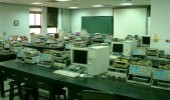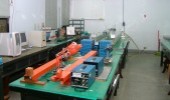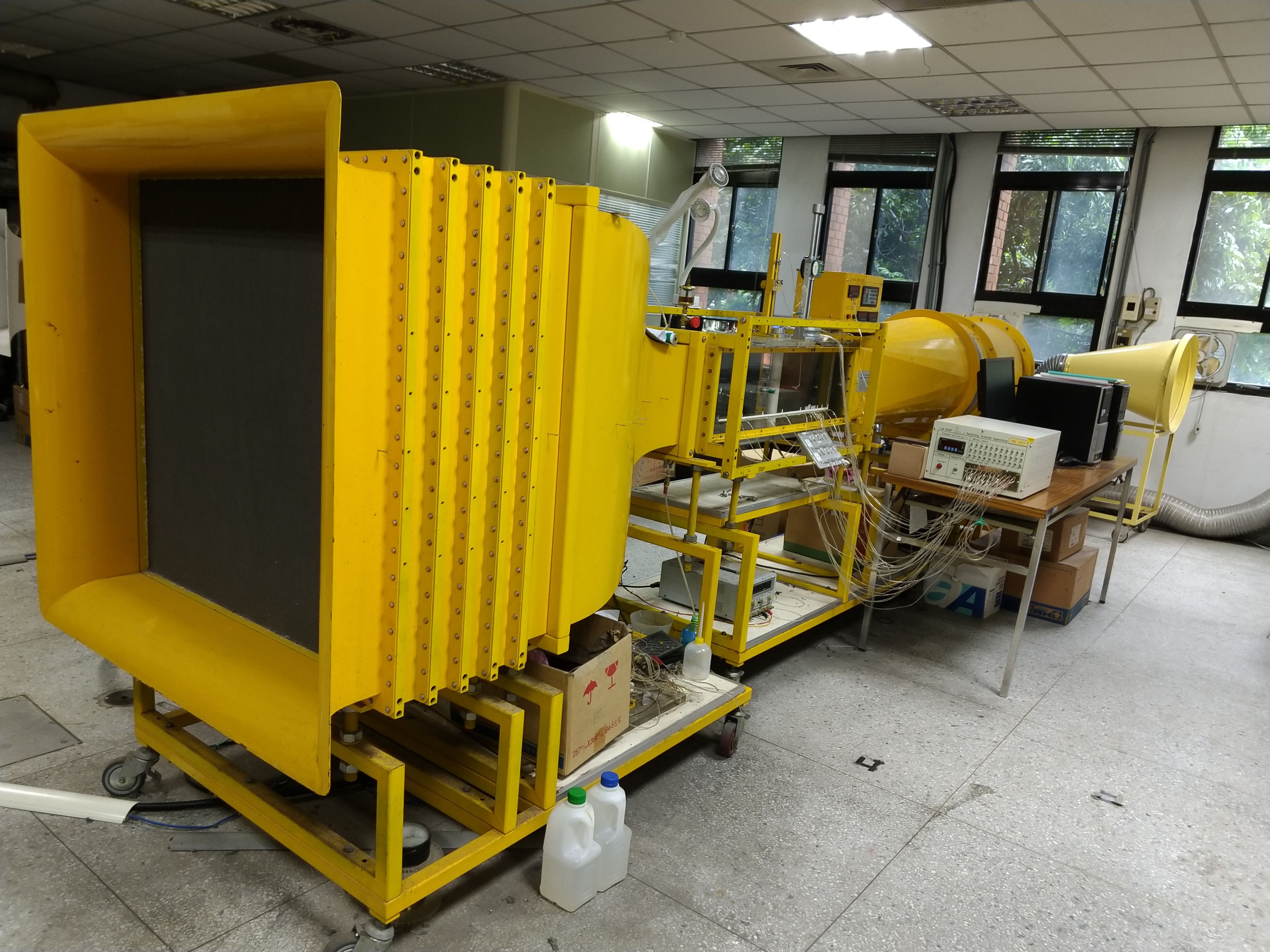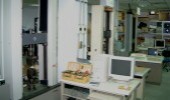Research
Overview
Mechanics is a key foundation of engineering. We often enjoy the convenience of technological inventions with little awareness what buried behind the design and manufacturing of each invention is a myriad of analyses, calculations, measurements and experiments. From submarines, rockets and satellites, to microelectromechanical systems and electronic packaging, technologies available today are the collective work of the scientific progress in solid mechanics, fluid mechanics, kinematics, and various other fields. At IAM, we actively promote large-scale meta-research. Our students and faculty are trained in both theoretical, experimental and data analyses emphasizing both academic and practical aspects of our research. We make every effort to contribute to the development of our country, and to make an impact in the world.
Since our establishment, year after year, we strive to expand our teaching and facilities, as well as improve our education and research. As of now, we have 30 full-time academic staff —including 2 joint appointment professors—and 201 postgraduate students. Additionally, we frequently invite influential scholars from all over the world to give lectures and take part in our research programs.
Since 1994, the primary focus of our research shifted from military technology to the construction of our country’s industries. With exceptional research teams and top-notch equipment, we strive toward towards world-class research in mechanics, and apply them in the industry as appropriate.
Our research projects include:
- Ministry of Science and Technology Research Project 科技部專題研究計畫
- Industry-Academia Cooperation Project 產學合作計畫
- Ministry of Education Projects of Commissioned Research 教育部委託研究計畫
- National Defense Foundation Projects of Commissioned Research 國防基金委託研究計畫
- Ministry of Economic Affairs Academic Technology Development Program 經濟部學界科專計畫
- Industrial Cooperative Education Cooperation Project 業界建教合作計畫
With annual funds exceeding 100 million NTD.
Our current research focuses on the following:
- Waves and MEMS/NEMS波動與微/奈米機電系統
- Biomedical and Energy System 生醫與能源系統
- Meso-scale Mechanics 跨尺度力學系統
IAM currently has 27 doctoral students and 174 master's students, forming a strong research team under the guidance and mentoring of our faculty. Our student to teacher ratio is 6.7, which is on par with Harvard's ratio of 6 and U. Tokyo's of 6. In addition to a highly competent teaching force and research staff, we have 6 outstanding technical staff to assist with teaching and research, and also 2 group members and 2 contract employees to aid in administration.
We believe that with the contribution of each and every member of the faculty, both staff and students alike, our institute will continue to grow, contributing to nurturing of future leaders and world-class scientific advancement.
Educational Objectives
Our primary focus is to nurture professionals in the field of mechanics with leadership and independent research skills.
The 5 Educational Principles at IAM:
1. Equal emphasis on theories, experiments and mathematics
Students of our institute are required to take theoretical, experimental and mathematical courses in order to obtain an academic degree, including Applied Mathematics, Elasticity, Dynamics, Fluid Dynamics, Electromagnetism, Experiments on Applied Mechanics, Experiments on Electronics and more.
This requirement ensures that students will have a sound foundation in research, and enable their adaptability. With these abilities, students will have a broader range of possibilities in the future and will be better equipped to cater to the needs of the industry.
2. Interdisciplinarity
Several research groups at IAM integrate research discipline including mechanics, biomedicine, information science, electromechanical systems and more. Dissertations and theses often involve interdisciplinary and system integrated research.
In efforts to further promote interdisciplinary talents, our faculty members frequently cooperate with other departments to offer courses that are related to more than one area and that incorporate results from research projects, such as Micro-electro-mechanical System (MEMS) & Nanotechnology, Fabrication & Design in Optical MEMS, Physiological Fluid Dynamics and more.
3. Internationalization
As of now, up to 60% of our courses are conducted in English. Under this environment, students will be able to adjust more quickly to both the international academic world and various industry positions as our country continues to promote globalization.
Furthermore, in response to NTU Dual Degree Programs and International Graduate Program, IAM continues to increase the proportion of courses conducted in English in order that international students will be able to pursue a degree at IAM.
Each year, several master's and doctoral students of IAM take part in short term research projects abroad. IAM also frequently welcomes postgraduates from all over the world to conduct short-term study and postdoctoral research. In the future, IAM will continue to further establish connections with prestigious universities worldwide to increase our doctoral students’ opportunities to engage in research overseas.
4. Cultivation of Practical Abilities
Several of the courses and research programs offered in IAM include implementation, experiments and internships. For instance, Experiments on Electronics, Experiments on Applied Mechanics, Experiments on Nanomedicine, and Experiments on Nanotechnology all help to nourish students’ practical and hands-on abilities. IAM also aims to train students in laboratory skills including independent learning of scientific principles, instruments and apparatus instruction manuals, and experimental design methodology.
Each student is expected to take part in both conducting experiments and collecting data. In addition to studying theories and attaining knowledge, students engage in practical work and gain independent thinking skills and engineering, systems and component designing skills from those hands-on experiences. Students work in groups to carry out their own projects. They come up with an interesting topic, and work out all the details themselves as well. This includes research motivation, literature review, acquisition of materials, instruments and apparatus, collecting of data, and subsequently, experiment report writing, oral presentation and presentation of implementation results. Although tough and time-consuming, this project is widely acknowledged by both students and alumni as a golden opportunity to gain valuable experience that cannot be obtained from textbooks or course materials.
5. Interaction with Industries
In an effort for students to be more informed in regards to mechanics and mechanics-related technology, every Monday throughout the semester, IAM invites reputable experts and/or scholars to deliver seminars. Students are given the opportunity to approach different fields and learn about academic and industrial development, thereby allowing them to be more up-to-date with current technology and trends, as well as engineering challenges. Students will also acquire further understanding of the importance of engineering planning, management and leadership skills.
On the other hand, through the cooperation projects of the faculty members with the industry, IAM provides students first-hand experiences in facing obstacles currently encountered by industries and also the opportunity to take part in research and developmental projects.
IAM also encourages students to participate in various academic and industrial technological competitions to boost their imagination and creativity as they integrate the knowledge they had gained from their courses into practice. Furthermore, in 1997, IAM began a mentorship program by inviting alumni with significant contributions to the industrial world to share industry-related news and information, and to offer advisory assistance so that students will be better prepared to enter the industrial world in the future. The talks were divided into individual/small group and group consultations. Group consultations focused on the incorporation of academics and employment, whereas the individual/small group consultations discussed the overview of industries and employment preparation. Participating students engaged with the speakers regarding aspects of the industry, as well as elements in job search.
All four of the talks received excellent feedback from the students. In November 2017, IAM was accredited by IEET after series of assessment including the on-site visit. The evaluation committee further encouraged and advised the increase of the number of industrial special lectures and visits, which IAM has enhanced since.
Research Labs
| Lab Name | Room | Ext. | Advisor | Phone |
| Biomedical Engineering Lab | 008-A | 65662 | Dr. Shau,Yio-Wha | +886-2-3366-5660 |
| Biomimetic Engineering Lab | 008 | 65253 | Dr. Wang, An-Bang | +886-2-3366-5651 |
| Microfluidics Lab | 012 | 65658 | Dr. Wo, Andrew M | +886-2-3366-5656 |
| Biomechanics and Ultrasound Imaging Lab | 013A | Dr. Lin, Che-Yu | +886-2-3366-5653 | |
| Mobile Advanced Storage Technology Lab | 015 | 56019 | Dr. Wu, Kuang-Chong | +886-2-3366-5695 |
| Biomechanical Microsystems Lab | 102 | Dr. Hsu, Yu-Hsiang | +886-2-3366-5607 | |
| Environmental and Energy Devices Lab | 105-A | 69423 | Dr. Chen, Jian-Zhang | +886-2-3366-5694 |
| Vortex Dynamics and Bio-Medical Fluid Mechanics Lab | 106 | 65669 | Dr. Chu, Chin-Chou | +886-2-3366-5668 |
| Advanced Thermal Science and Flow Control Lab | 108 | 65650 | Dr. Wang, An-Bang | +886-2-3366-5651 |
| Nano-Bio Lab | 202 | Dr. Sheen, Horn-Jiunn | +886-2-3366-5632 | |
| Soft Matter and Active Material Lab | 223 | 65543 | Dr. Jiang, Hong-Ren | +886-2-3366-5620 |
| Safety Evaluation Lab | 227 | 65624 | Dr. Liu, Pei-Ling | +886-2-3366-5622 |
| Mechanics of Nano-Materials Lab | 229 | 65680 | Dr. Wu, Kuang-Chong | +886-2-3366-5607 |
| Cerebral Haemodynamics Group | 229 | 65675 | Dr. Stephen Payne | +886-2-3366-5682 |
| Nanophotonics & Metamaterials Lab | 308 | 55006 | Dr. Chern, Ruey-Lin | +886-2-3366-5853 |
| Lithium Battery and Multi-scale Mechanics Lab | 323 | 65689 | Dr. Chen, Kuo-Ching | +886-2-3366-5601 |
| Multi-scale Flow Physics and Computation Lab | 323 | 65689 | Dr. Chou, Yi-Ju | +886-2-3366-5068 |
| Microfluidics and Bio-Sensor Lab | 324 | 65634 | Dr. Sheen, Horn-Jiunn | +886-2-3366-5632 |
| Navigation and Control Lab | 325 | 65685 | Dr. Wang, Li-Sheng | +886-2-3366-5686 |
| Nano and Micro Scale Fluid Mechanics Lab | 326-A | 65674 | Dr. Lei, U | +886-2-3366-5673 |
| Resonant MEMS Lab | 326-B | 65667 | Dr. Li, Wei-Chang | +886-2-3366-5636 |
| Computational Materials Mechanics Lab | 327 | 65665 | Dr. Chen, Chih-Hung | +886-2-3366-5678 |
| Computational Mechanics and Intelligence | 327 | 65665 | Dr. Chou, Chia-Ching | +886-2-3366-5639 |
| Energy and Environmental Fluid Mechanics Lab | 328 | 65690 | Dr. Chen, Falin | +886-2-3366-5692 |
| Biochemical Sensing Systems Lab | 418 | 65625 | Dr. Chen, Chien-Fu | +886-2-3366-5608 |
| Mechanics for Biomedical & Opto-electrical Engineering Lab | 422 | Dr. Chang, Chien-Cheng | +886-2-3366-5672 | |
| Waves and Fracture Mechanics Lab | 426 | 65629 | Dr. Kuo, Mao-Kuen | +886-2-3366-5630 |
| Smart Materials and Energy Harvesting Laboratory | 428 | 65681 | Dr. Shu, Yi-Chung | +886-2-3366-5627 |
| NTU Nano-BioMEMS Group | 433 |
65646 56016~8 |
Dr. Lee, Chih-Kung Dr. Hsu, Yu-Hsiang |
+886-2-3366-5645 +886-2-3366-5652 |
| Nano-BioMEMS Group-Intelligent Sensing Lab (PZGroup) | 433 |
65646 56016~8 |
Dr. Chang, Pei-Zen | +886-2-3366-5652 |
Timeline
| Year | Note |
|
1984 |
The Institute of Applied Mechanics (IAM) was founded. The first Director of the Institute: Prof. Pao, Yih-Hsing. |
|
1985 |
9th Conference on Theoretical and Applied Mechanics. |
|
1986 |
The second Director of the Institute: Prof. Lee, Shao-Lin. |
|
1987 |
The building of the Institute was erected. |
|
1988 |
Completion of the Computer Center and purchase of the Mini Super Computer: CONVEX C1. |
|
1989 |
The third Director of the Institute: Prof. Pao, Yih-Hsing. |
|
1990 |
Prof. Yeh, Chau-Shioung was appointed as the Director of National Center for Research on Earthquake Engineering |
|
1991 |
Prof. Pao, Yih-Hsing received the Prof. Sun, F.D. Memorial Gold Medal Award from Society of Society of Theoretical and Applied Mechanics. |
|
1992 |
Symposium of the Latest Developments in Polymer Composites. |
|
1993 |
Decennial Celebration. Symposium of Modern Mechanics. |
|
1994 |
The fourth Director of the Institute: Prof. Wu, Kuang-Chong. |
|
1995 |
8th Asia Pacific Conference for Non-Destructive Testing |
|
1996 |
Aeronautical and Astronautical Society of the Republic of China Annual Conference |
|
1997 |
The fifth Director of the Institute: Prof, Wu, Tsung-Tsong. |
|
1998 |
Establishment of the Micro-Electro-Mechanical-Systems Research Center. |
|
1999 |
Completion of the cleanroom of the Micro-Electro-Mechanical-Systems Research Center. |
|
2000 |
The sixth Director of the Institute: Prof. Chu, Chin-Chou. |
|
2001 |
Cross-strait Middle School Mechanics Competition. |
|
2002 |
Colloquium on Outlooks on Mechanics |
|
2003 |
The seventh Director of the Institute: Prof. Liu, Pei-Ling. |
|
2004 |
Second Decennial Celebration. 28th Conference on Theoretical and Applied Mechanics. |
|
2005 |
3rd Taiwan-Japan Mechanical and Aeronautical Engineering Conference. |
|
2006 |
The eighth Director of the Inst.: Prof. The eighth Director of the Institute: Prof. Kuo, Mao-Kuen. |
|
2007 |
Cross-strait Symposium of Theoretical and Applied Mechanics. |
|
2009 |
Accredited by IEET, a Washington Accord signatory. IUTAM Symposium on Recent Advances of Acoustic Waves in Solids. The ninth Director of the Institute: Prof. Chang, Chien-Cheng. |
|
2010 |
International Conference on Engineering Mechanics. 6th Cross-strait Symposium of Engineering Mechanics. |
|
2011 |
18th National Computational Fluid Dynamics Conference. |
|
2012 |
The tenth Director of the Institute: Prof. Chang, Chia-Ou. |
|
2013 |
Cross-strait Forum on Mechanical Engineering Technology. |
|
2014 |
Third Decennial Celebration. |
|
2015 |
The eleventh Director of the Institute: Prof. Wang, Li-Sheng. |
|
2017 |
On-site visit of IEET accreditation of engineering educational programs. |
|
2018 |
Accredited by IEET, a Washington Accord signatory. The twelfth Director of the Institute: Prof. Sheen, Horn-Jiunn. |
|
2019 |
The Alumni Association of the Institute was established. |
|
2021 |
The thirteen Director of the Institute: Prof. Kuo-Ching Chen. |
Electronics Laboratory
Electronics Laboratory
Lab 0: Introduction to the Course and Instruments
Dual Trace Oscilloscope
Function Generator
DC Power Supply
Digital Multimeter
Lab 1: DC Circuits and Capacitors
Ohm’s Law
Voltage Divider
RC Circuit
Low-pass Filter
High-pass Filter
Filter Application
LC Filter
Lab 2: Diode Circuits
The Diode
LC Resonant Circuit
Rectifier Circuits
Diode Clamp
Diode Limiter
Lab 3: Bipolar Transistors
Transistor Junctions are Diodes
Emitter Follower
Input and Output Impedance of Follower
Single-Supply Follower
Transistor Current Gain
Current Source
Common-emitter Amplifier
Emitter Follower Buffer
Transistor Switch
Lab 4: Field-Effect Transistors
FET Characteristics
FET Current Sources
Source Follower
FET as Variable Resistor
Lab 5: Operational Amplifier I: Idealized View
Open-Loop Test Circuit
Inverting Amplifier
Non-inverting Amplifier
Follower
Current Source
Current to Voltage Converter
Summing Amplifier,
Push-pull Buffer
Lab 6: Operational Amplifier III: Positive Feedback, Good and Bad
Two Comparators
RC Oscillator
555 IC Oscillator
Sawtooth Oscillator
Triangle Oscillator,
Sine Wave Oscillator: Wien Bridge
Follower: Op Amp Instability
Lab 7: Voltage Regulators
The 723 Regulator
Three Terminal Fixed Regulator
Adjustable Three-terminal
Regulator: 317
Voltage References
”Crowbar” overvoltage protection
Integrators
Differentiators
Lab 8: Digital Gates
Input & Output Characteristics of Integrated Gates: TTL & CMOS
Applying NANDs to Generate Particular Logic Functions
Two Inverters
CMOS NAND
\CMOS Three-State
Lab 9: Flip Flops
A primitive flip-flop: NAND Latch
D Type
J-K Type,
J-K in Counters
Shift Register
7490 Decade Counter
7447 BCD to 7 Segment Decoder
Lab 10: A/D and D/A
Weighted-Resistor DAC
R-2R Ladder DAC
DAC0800 8-Bit Digital-To-Analog Converters
ADC0804 8-Bit Analog-To-Digital Converters
ADC-To -DAC Circuit
Teaching Labs
The Institute now has four teaching laboratories, one computer room and one machine shop. In addition, the Northern Micro-Electro-Mechanical System (MEMS) Center of Nation Science Council (NSC) is also locate inhouse.
The teaching laboratories consist of the following:
|
Name
|
Photo
|
負責技士
|
聯絡電話
|
|
教學實驗室
|
|||
 |
徐發義
|
+886-2-3366-5612
|
|
 |
林佑思
|
+886-2-3366-5610
|
|
 |
林佑思
|
+886-2-3366-5610
|
|
 |
廖家文
|
+886-2-3366-5609
|
|
|
其他設備
|
|||
 |
陳建兆
|
+886-2-3366-5615
|
|
 |
廖家文
|
+886-2-3366-5609
|
|
Core Abilities
Students’ Core Abilities
-
Mechanics: proficiency in mechanics and related fields, including the application of mathematics, science and engineering.
-
Independent thinking: capabilities of independent thinking, innovation and designing engineering systems, components and processes.
- Research skills: competence in planning and conducting research, as well as thesis and report writing.
-
Analytical skills: excellence in designing and implementing engineering practices, in carrying out experiments, and also in analyzing and interpreting data.
- Communication: outstanding communication, organizational, teamwork and leadership skills
- Life-long learning: life-long pursuit in personal development, international perspective and foreign language skills.
- Ethics: complete understanding of professional ethics and social responsibilities.
Admissions
Foreign Students
Applicants who do not have overseas Chinese status and do not hold a Republic of China's passport and having a bachelor's degree are eligible to apply for graduate study in Master's programs; and those having a Master's degree are eligible to apply for graduate study in Ph.D. programs. (Foreign student doesn't include Hong Kong or Macau citizen status)
- NTU Student Dorm Information
Website: https://osa_dorm.ntu.edu.tw/en/AboutUs/DormInformation/Dorm_Information
Research Fields
Since 1994, the Institute has been gradually diverting the direction from the defense-related research to an interdisciplinary and state-of-the-art research oriented towards world-wide trend and local needs. The new research direction embraces areas in mechanics, nanotechnology, biomechanics, biomedical research, information, and mechatronics. The Institute has further identified three major fields in connection with "Mechanics in Nano-Revolution", namely,
Waves and N/MEMS
Waves and N/MEMS with focus on the analyses and applications of the elastic waves and electromagnetic waves and their interactions.
Nano-Biomechanics
Nano-Biomechanics with focus on the examination of characteristics and interactions of micro- or nano-scale biological structures by mechanics approach.
Multi-Scale Mechanical Systems
Multi-Scale Mechanical Systems with focus on the exploration of the analytic, experimental, and computational aspects of the systems.
